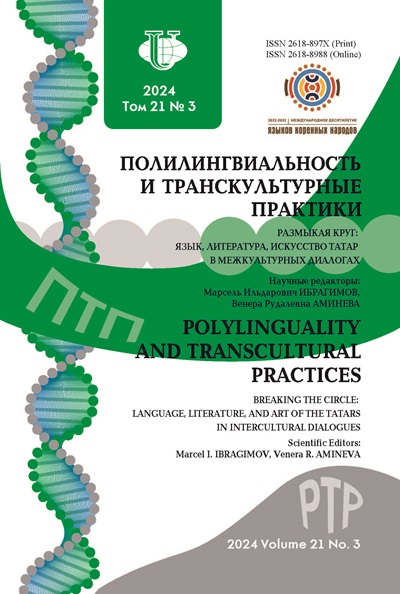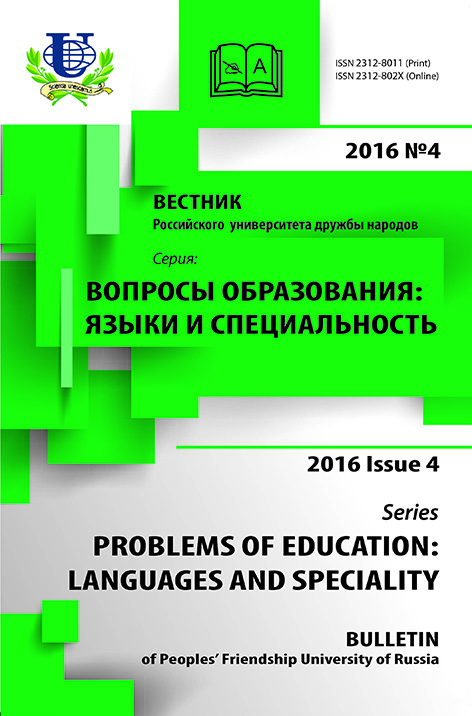СОПРОТИВЛЕНИЕ ГЛОБАЛИЗАЦИИ С ПОМОЩЬЮ ГРАММАТИЧЕСКИХ СРЕДСТВ: НАГЛЯДНЫЕ АСПЕКТЫ РУССКОЙ ГРАММАТИКИ
- Авторы: Босиако А.А.1
-
Учреждения:
- Кафедра современных языков
- Выпуск: № 4 (2016)
- Страницы: 24-40
- Раздел: Статьи
- URL: https://journals.rudn.ru/polylinguality/article/view/14657
Цитировать
Полный текст
Аннотация
Процесс глобализации рассматривается в статье в аспекте теории перевода. Главный тезис работы - утверждение о том, что в условиях глобального технического прогресса перевод является основным средством распространения информации в динамично меняющемся мире.С учетом взаимосвязи между культурами, языками, экономическими отношениями информация не может быть передана в каждый из этих секторов общества через один международный лингва франка. Хотя влияние английского языка в глобальной коммуникативной сети очевидно, перевод предоставляет многим языкам доступ к информации, которая является результатом социальных взаимодействий в контексте глобализации. Перевод«сопротивляется» глобализации и диктату международного языка через использование грамматических структур языка оригинала (ЯО) и переводимого языка (ПЯ).Такой подход предполагает, что существуют типологические различия между языками, которые проявляются через определенные грамматические признаки. Эти различия выявляются через язык оригинала и через перевод текста.
Ключевые слова
Об авторах
Альберт Антви Босиако
Кафедра современных языковУниверситет Ганы, P O Почтовый ящик LG 207, Легон
Список литературы
- Brandl K. Communicative Language Teaching in Action: Putting Principles to Work. Upper Saddle River, N.J.: Pearson Prentice Hall, 2008.
- Cook V. Second Language Learning and Language Teaching, Third Edition. London: Arnold, 2001.
- Giddens A. The Consequence of Modernity: Cambridge: Policy. Globalization and Aspects of Translation. 2010. Edited by Said M. Shiyab, Marlyn Gaddis Rose, Juliane House and John Duval. Cambridge scholars Publishing.
- Lado R. Language Teaching: A Scientific Approach. New York: McGraw-Hill, 1964.
- Lightbown P., and Spada N. How Languages are Learned, Third Edition. Oxford: Oxford University Press, 2006.
- Mazmi A. English in Africa after the Cold War. Clevedon. Multilingual Matters.
- Pirogova L. Conjugation of Russian verbs, second edition, revised and enlarged RUSSKIY YAZYK PUBLISHERS, MOSCOW, 1988.
- Pym A. Globalization and the Politics of Translation Studies. Paper delivered to the conference “Translation and Globalization” (Canadian Association of Translation Studies), Canada, 29 May, 2003.
- Presas M. Bilingual Competence and Translation Competence, Developing Translation Competence edited by Schaffner, Ch&Adab, Amaterdam and Philadelphia: John Benjamin’s Publishing Company, p.21.
- Penny R. Variation and Change in Spanish. Cambridge University Press, 2003.
- Omaggio Hadley A. Teaching Language in Context, Third Edition. Boston: Thomson Heinle, 2001.
- Rutherford W, and Sharwood Smith M., eds. Grammar and Second Language Teaching: A Book of Readings. New York: Newbury House, 1988.
- Rivers W. Teaching Foreign Language Skills. Chicago: The University of Chicago Press, 1968.
- http://www.englishraven.com/methodgramtrns.html















